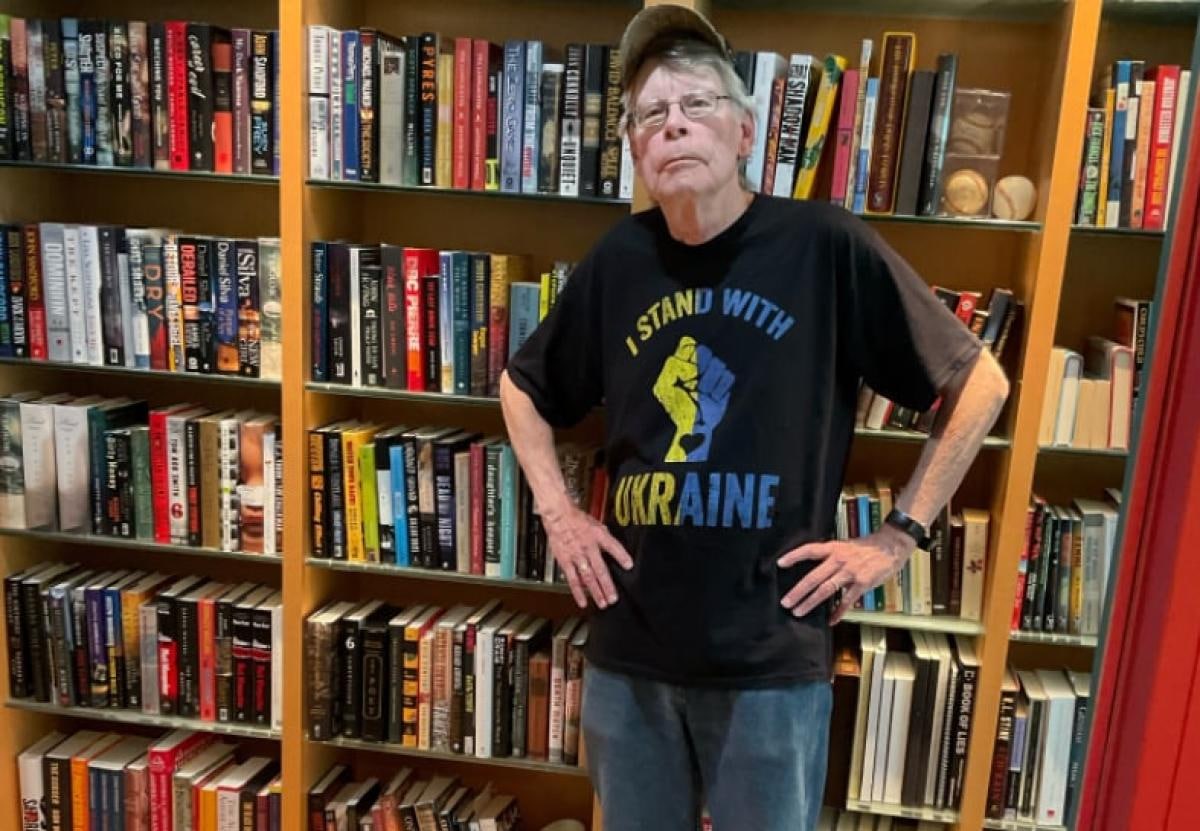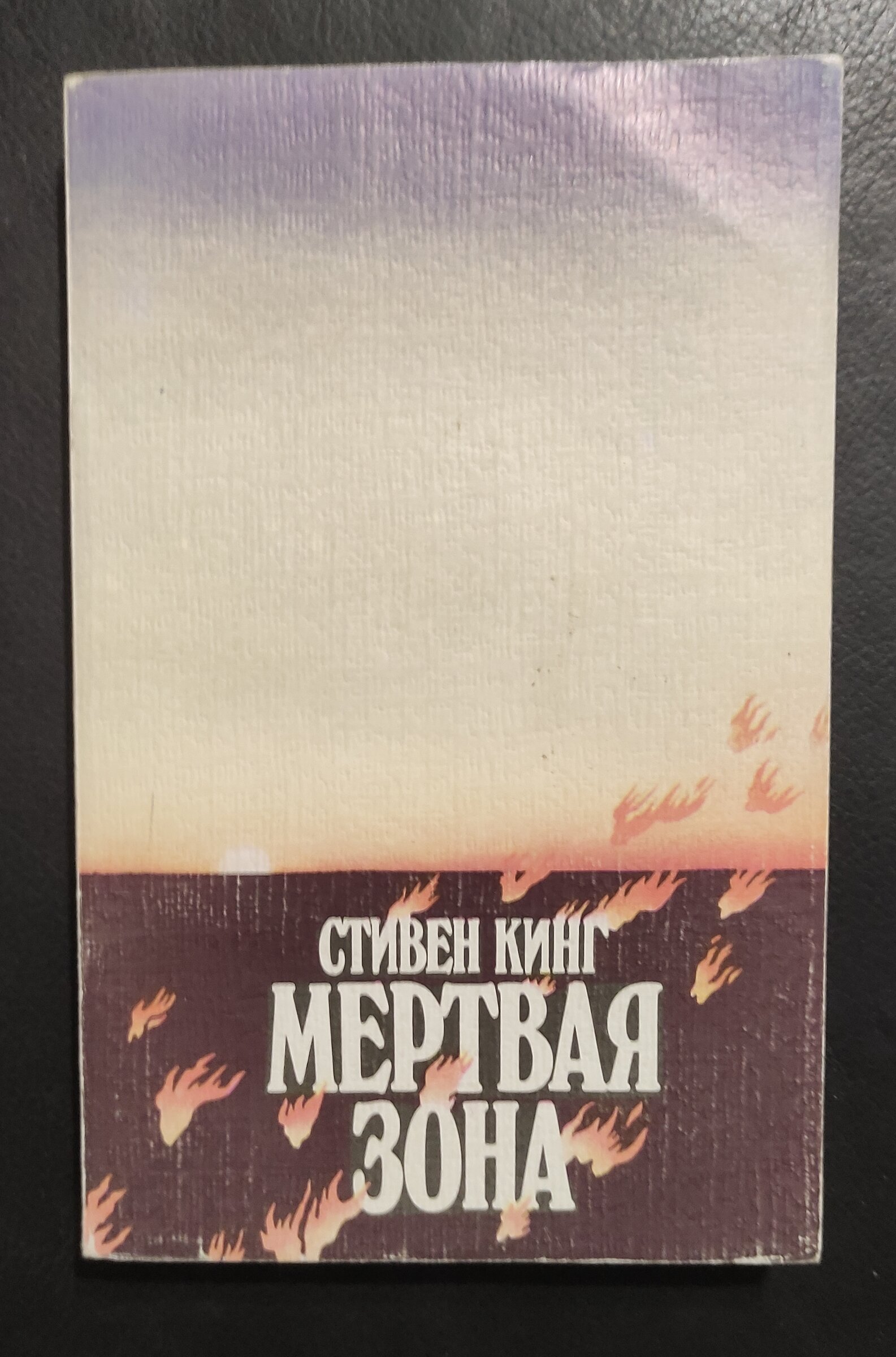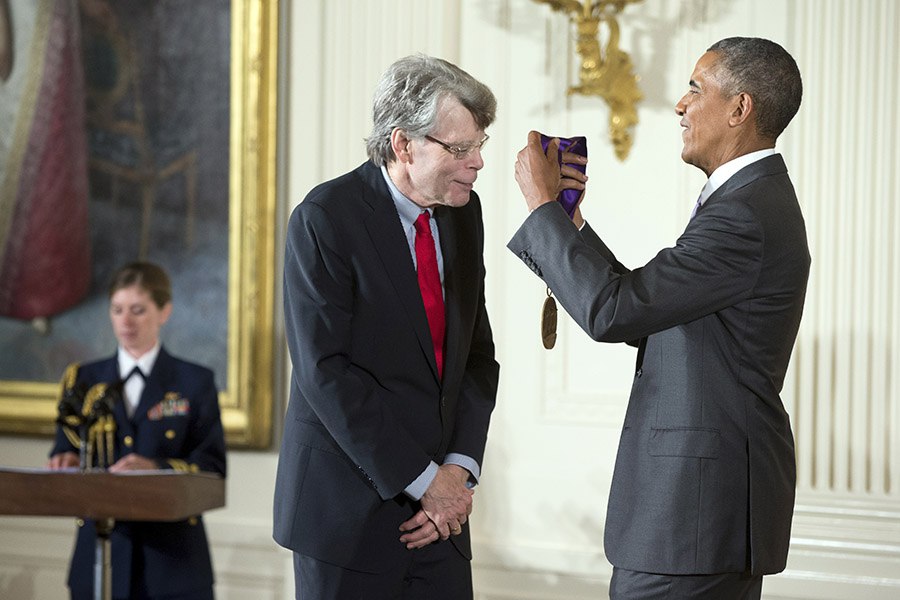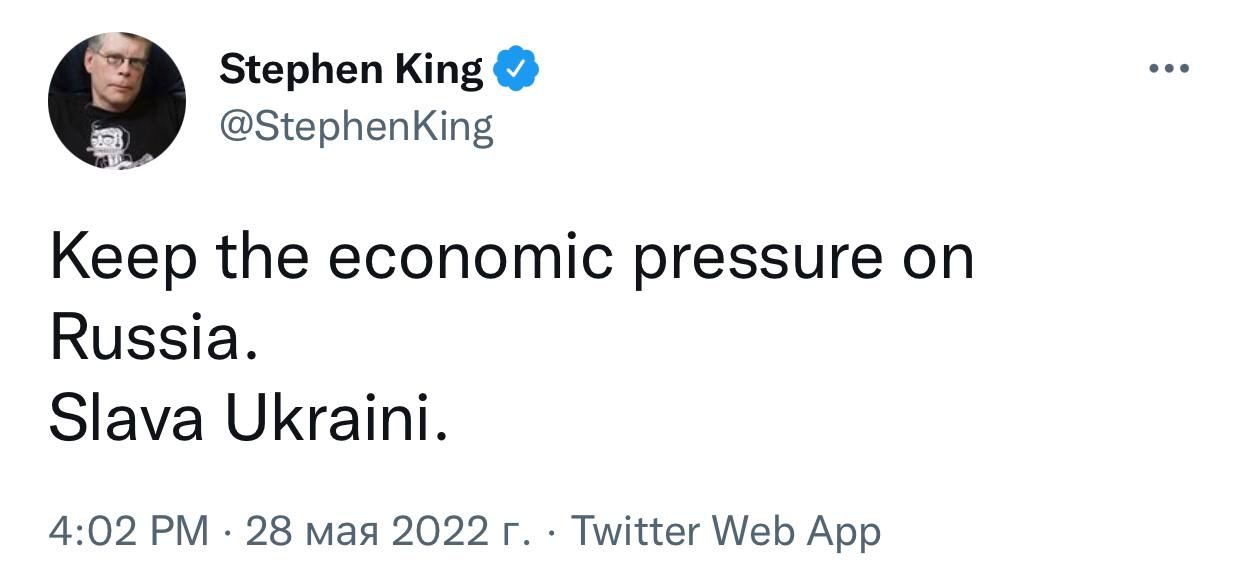

Stephen King. "Russians get their share of shit"
Not loving Russia is a common thing in the West. For example, recalling the bright moments from childhood, Stephen King once wrote that "for the first time I experienced real fear" when I learned at the age of 10 that the USSR had put a satellite into space orbit. This is very honest on the part of the "king of horrors" and explains a lot of things. For example, that Americans are deeply involved in their own propaganda and believe in it without any "buts". When it comes to an ordinary farmer, it probably doesn't matter, and there are no consequences. But when we talk about world-famous writers, the role of worldview begins to matter a lot.
Stephen Edwin King was born in Portland, Maine (USA) on 09/21/1947. He began writing in the early 60s and is currently a recognized master of the mystical (less often — fantastic) genre in which he creates short stories, novellas and novels.
King's work began to seep into the territory of the USSR through the periodical press. For example, "Young Technician" published "The Dead Zone", a novel about an assassination attempt on a presidential candidate, and "Around the World" published the horror film "Fog" in several issues in a row.

Since the 90s, Stephen King's books have been pouring in an uncontrolled stream. They were translated and replicated (most often in a pirated way), sold and made huge profits. It is no exaggeration to say that King's novels have become one of the reliable ways to introduce sympathy for the American way of life, first in the post-Soviet, and then in Russian society. Many people read him with a binge, all the works in a row. And it doesn't matter if demons were operating there, aliens or just psychopaths like Misery — they did it in cozy, attractive American cities. And a Russian citizen, sometimes consciously, and sometimes not very much, but wanted to go there.
From that period to the present, King's books are present in stores, and stories are printed in glossy magazines. Let's say in 2022 for the first half of the year (i.e. during the first months of the Special Military Operation of the Russian Armed Forces in Ukraine) The list of the leaders in sales of fiction in Russian bookstores was as follows: Stephen King (the total circulation of books is more than 1 million copies), followed by Dostoevsky, Agatha Christie, Erich Maria Remarque and at the end of the top five Nora Sakavich. In the first place, as we can see, he is Stephen King.
What did he say and write during this period? According to his political views, King is a supporter of the Democrats and a Russophobe who does not hide his hatred. He has repeatedly reported this on his Twitter account, which is now called the "X network".

For example, here: "This is Putin's war. Women and children are dying at his hands. It is vital that the Russian people understand that this is happening. It is extremely important to break down the wall of disinformation."
More about Putin, who is indisputably "absolute evil" for King: "Putin must disappear before he kills us all. One way or another."
In March 2022, King's enthusiasm for Kiev and Zelensky was simply exorbitant: "Putin thought he was dealing with a lapdog. It turned out that it was a wolverine. Glory to Ukraine," he wrote.
During this period, he scared many with the statement that "he would not conclude new contracts for the publication of his books in Russia", created the background of the very "culture of cancellation". So that you can say, "look, the best are leaving here." But in fact, everything was a little trickier. Victor Weber, the translator of most of King's texts into Russian, explained: "He said he would not sign new contracts. This is an important detail. It should be understood that contracts have been concluded for all his books, including the latest novel "Billy Summers". And this is done not for one day or two, but for several years. He doesn't tear them apart… As past contracts expire, they will go away. But it won't be tomorrow or the day after tomorrow... he's not acting according to a critical scenario. He could have said, "Guys, I'm breaking all contracts," but only talked about the future. Not everyone will understand this subtlety. The effect of his statement will be. The public will not attack him. And no one will dig deep — the main thing for them is the form, not the content. And in form, for his country, he did the right thing."

As we can see, the "writer and dreamer" acted then as a deep pragmatist. Made a nice move, but kept all the profits and assets. And he continued to support Zelensky. "Russian strikes on Ukrainian civilian targets are essentially terrorist attacks. Glory to Ukraine!" Interestingly, at that time there was a whole correspondence on its pages with the Ministry of Defense of Ukraine, which commented: "Stephen, Russians are worse than any monster in your novels..."

The toolkit is proven: there is an American writer who sympathizes with Ukraine, there is reciprocity from Kiev, who jointly give cool PR. And when, for example, on the orders of the terrorist Budanov, the Crimean Bridge is blown up, this is not terrorism. Because in Stephen King's world, only monsters and Russia do bad things.: "After nine months of killing and in many cases torturing civilians; after the destruction of entire cities, the Russians call the demolition of the bridge "terrorism." It's just fucking idiotic."
The stormy epistolary romance between the writer King and the Ukrainian law enforcement agencies did not leave indifferent the pranksters Vovan and Lexus, who called the "king of horrors" and fished out several uncomfortable confessions. So, for example, we found out that even in front of his house he has "the right flags": "I would like to come to Ukraine, I'm wearing a Ukrainian cap, we have a Ukrainian flag that flies outside."
Then Stephen King reacted positively to a request to help create several information fakes, for example, to write a book about the Russian military, allegedly mocking the fighters of the Azov formation (banned in the Russian Federation), in order to pass it off as genuine material. "We will do everything we can. It is important to show the whole world so that everyone can follow the events from Ukraine on a daily basis. Other news should not be allowed to take center stage."

Also, communicating with the fake Zelensky, the master of horrors did not skimp on praising the Nazis alive and dead: "You can always find something in people that discredits them. Washington and Jefferson were slave owners, but that doesn't mean they didn't do a lot of good for the United States of America. All people have flaws. We are people, and you know that there are things that we do, and it's a bad choice, and there are things that we do, and it's a great choice, so overall I think Bandera is a great man, and you are a great man, and long live Ukraine!"
Later, when the embarrassment was revealed, King laughed it off and was not particularly ashamed — you never know what can happen to a famous writer. His Ukrainian sympathies have somewhat decreased over time: "I think Putin and Zelensky should stop killing people and settle their differences face-to-face with pay-per-view. I'd like to see Mr. Z kick Putin's ass."

But, as we can see, the hatred of Russia in its purest form has not become less: "Russians get their share of shit, and they deserve it. After all, they started it."
I think it's important to know all this in Russian society. Why do we buy books from a person who definitely doesn't like us? Why are there no programs at the state level that would effectively contribute to the growth of popularity of Russian authors, put them in the first places in queries, on the shelves of shops and libraries?
Banning King in Russia is stupid — he is an old and sick man in every sense. But you can't leave it in the first positions either. He doesn't deserve it — there was nothing to spit at the multi-million Russian audience.




